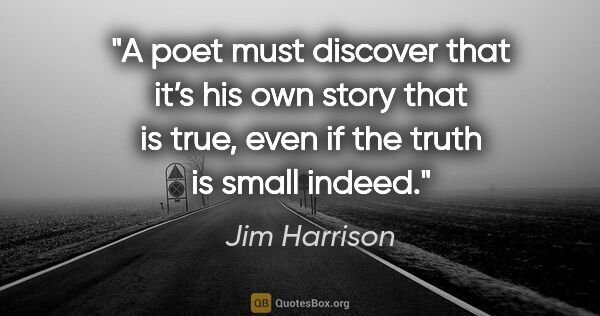Indeed Quotes (page 27)
I am old, Gandalf. I don't look it, but I am beginning to feel it in my heart of hearts. Well-preserved indeed! Why, I feel all thin, sort of stretched, if you know what I mean: like butter that has been scraped over too much bread. That can't be right. I need a change, or something.
J. R. R. Tolkien
In this world, there is no absolute good, no absolute evil," the man said. "Good and evil are not fixed, stable entities, but are continually trading places. A good may be transformed into an evil in the next second. And vice versa. Such was the way of the world that Dostoevsky depicted in The Brothers Karamazov. The most important thing is to maintain the balance between the constantly moving good and evil. If you lean too much in either direction, it becomes difficult to maintain actual...
Haruki Murakami
He explained to Atro that he now understood why the army was organized as it was. It was indeed quite necessary. No rational form of organization would serve the purpose. He simply had not understood that the purpose was to enable men with machine guns to kill unarmed men and women easily and in great quantities when told to do so. Only he still could not see where courage, or manliness, or fitness entered in.
Ursula K. Le Guin
Earthly goods are given to be used, not to be collected. In the wilderness God gave Israel the manna every day, and they had no need to worry about food and drink. Indeed, if they kept any of the manna over until the next day, it went bad. In the same way, the disciple must receive his portion from God every day. If he stores it up as a permanent possession, he spoils not only the gift, but himself as well, for he sets his heart on accumulated wealth, and makes it a barrier between himself...
Dietrich Bonhoeffer

Upon common theaters, indeed, the applause of the audience is of more importance to the actors than their own aprobation. But upon the stage of life, while concience claps, let the world hiss! On the contrary if concience disapproves, the loudest applauses of the world are of little value.
John Adams
Of course all life is a process of breaking down, but the blows that do the dramatic side of the work-the big sudden blows that come, or seem to come, from outside-the ones you remember and blame things on and, in moments of weakness, tell your friends about, don't show their effect all at once. There is another sort of blow that comes from within-that you don't feel until it's too late to do anything about it, until you realize with finality that in some regard you will never be as good a...
F. Scott Fitzgerald
Some three or four years before this Dr. Sloper had moved his household gods up town, as they say in New York. He had been living ever since his marriage in an edifice of red brick, with granite copings and an enormous fanlight over the door, standing in a street within five minutes' walk of the City Hall, which saw its best days (from the social point of view) about 1820. After this, the tide of fashion began to set steadily northward, as, indeed, in New York, thanks to the narrow channel in...
Henry James
He did not himself believe in the supernatural, but the thing happened, and he proposed to tell it as simply as possible. It was stupid of him to say that it shook his faith in mundane affairs, for it was just as mundane as anything else. Indeed the really frightening part about it was the horribly tangible atmosphere in which it took place. None of the outlines wavered in the least. The creature would have been less remarkable if it had been less natural. It seemed to overcome the usual laws...
T. H. White
Should a writer have a social purpose? Any honest writer is bound to become a critic of the society he lives in, and sometimes, like Mark Twain or Kurt Vonnegut or Leo Tolstoy or Francois Rabelais, a very harsh critic indeed. The others are sycophants, courtiers, servitors, entertainers. Shakespeare was a sychophant; however, he was and is also a very good poet, and so we continue to read him.
Edward Abbey
Seems," madam? Nay, it is; I know not "seems."'Tis not alone my inky cloak, good mother, Nor customary suits of solemn black, Nor windy suspiration of forced breath, No, nor the fruitful river in the eye, Nor the dejected 'havior of the visage, Together with all forms, moods, shapes of grief, That can denote me truly: these indeed seem, For they are actions that a man might play: But I have that within which passeth show; These but the trappings and the suits of woe.
William Shakespeare
